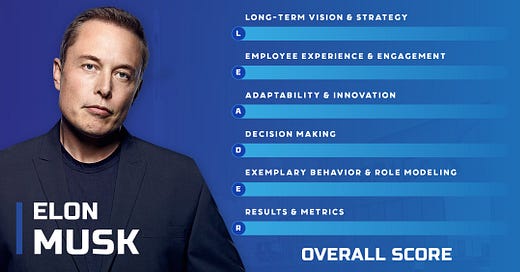Is Elon Musk A Good Leader? Using the L.E.A.D.E.R. Scorecard to Evaluate His Effectiveness & Performance
There's no doubt that Elon Musk has made a massive impact on the world. But is he a good leader and how can we find out? This framework can be used to evaluate all leaders, including you!
👋 Welcome to a 🔒 subscriber-only edition 🔒 of Great Leadership. Each week I share strategies, insights, and research for how you can become a better leader, create a culture where employees want to show up, and build a future-ready organization.
I’ve been working on developing a high level leadership scorecard that I can use to evaluate business leaders around the world. Periodically, my goal is to review a new leader and break down how the leader scores on all of the elements as well as give an overall LEADER score. My hope is that not only will this generate discussion but will also help you in your career and leadership journey.
This LEADER scorecard will ONLY be available for premium subscribers of Great Leadership. If you aren’t a subscriber yet, then I encourage you to sign up, it’s only a few dollars a month.
First, here’s a breakdown of what the scorecard looks like. I expect that overtime it might change a bit but it’s also something that you can use to evaluate your own leaders.
L = Long-term vision and strategy: This is fundamental for any leader. The ability to envision the future and strategize accordingly is crucial for guiding a team or organization toward success.
1-3: Unclear or inconsistent vision and strategy.
4-6: Vision and strategy are defined but not effectively communicated or implemented.
7-10: Clear vision and strategy that are well-communicated, consistently implemented, and aligned with organizational goals.
E = Employee experience and engagement: Recognizing the importance of employee well-being and their engagement levels indicates an understanding that leadership isn't just about top-down decisions, but also about fostering a positive work environment.
1-3: Low levels of employee satisfaction, engagement, and commitment.
4-6: Moderate levels of employee satisfaction; some areas need improvement.
7-10: High levels of employee satisfaction, engagement, and commitment with proactive measures to maintain them
A = Adaptability and innovation: In a rapidly changing world, a leader's ability to adapt and innovate is vital. This element reflects the importance of being proactive and responsive to change.
1-3: Resistant to change; limited innovation efforts.
4-6: Some efforts to adapt and innovate but lacking consistency or clear direction.
7-10: Actively promotes a culture of adaptability and consistent innovation.
D = Decision making: Central to leadership is the ability to make decisions—sometimes under pressure, often with incomplete information. A leader's judgment and decision-making capability is a key determinant of success.
1-3: Decision-making is slow, unstructured, or lacking transparency.
4-6: Decisions are made but might lack full stakeholder input or data-driven insights.
7-10: Decisions are timely, data-driven, and involve relevant stakeholders.
E = Exemplary behavior and role modeling: Leaders set the tone for an organization's culture. Their actions, values, and behaviors can inspire and influence those around them.
1-3: Leadership behaviors are inconsistent with organizational values.
4-6: Leadership sometimes displays exemplary behavior, but inconsistencies exist.
7-10: Leadership consistently models desired behaviors and values, setting a positive example for all.
R = Results and metrics: At the end of the day, leaders are often judged by the results they achieve. This element ensures a focus on tangible outcomes and data-driven assessments.
1-3: Limited use of metrics; results are below expectations.
4-6: Uses metrics but might lack alignment with strategic goals; results meet some expectations.
7-10: Metrics are strategically aligned, and results consistently meet or exceed expectations.
Today, I’m going to be looking at Elon Musk, the founder/CEO of companies including Tesla, SpaceX, X, and The Boring Company. He’s currently the world’s richest man with an estimated net worth of $250 billion
Born in Pretoria, South Africa, in 1971, Musk has emerged as one of the most influential figures in technology, space exploration, and sustainable energy. Musk's endeavors often resemble the ambitious feats of science fiction. Yet, time and again, he has turned his visionary ideas into tangible realities. Whether celebrated as a forward-thinking genius or criticized for his audacious proclamations, there's no denying that Musk's contributions continue to shape the trajectory of the modern world.
If you want me to do more posts like this then please let me know in the comments section and you can also suggest other leaders for me to review
Let’s break down all of the LEADER elements and see if Elon Musk is truly a great leader and why or why not.
Keep reading with a 7-day free trial
Subscribe to Future Ready Leadership With Jacob Morgan to keep reading this post and get 7 days of free access to the full post archives.





